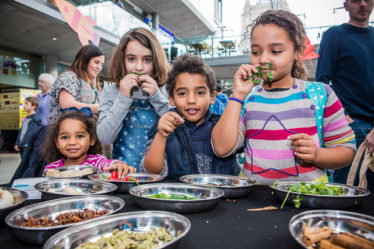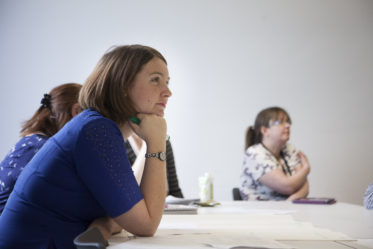UKSFN learning curves #6: building bridges between engineers and communities
10th January 2022 |
Since 2017, the UK Science Festivals Network (UKSFN), with funding from UK Research and Innovation (UKRI), has supported science festival practitioners to bring underserved audiences and researchers together.
To aid reflection amongst UKSFN members and the wider engagement sector, over the past two years, we have shared learnings from these projects in a series of blogs.
The sixth blog in our ‘UKSFN learning curves’ series is written by Irina Jarrett-Thorpe, director at Engineering Minds.
“GIRLS’ IMPACT ON ENGINEERING” – A pilot project
At Engineering Minds, we aim to help young people become the next generation of scientists and engineers by harnessing their knowledge and creativity – and have lots of Eureka moments along the way!
With support from UKRI and UKSFN, we were able to take our work in an entirely new direction by working with young people of secondary school age, and also developing new partnerships by engaging with external engineers and researchers.
This pilot project ‘Girls’ Impact on Engineering’ aimed to inspire interest in a career in engineering for 15 girls aged between 11-14 from underrepresented groups in Greenwich, London.
Being a new direction of work for us, naturally, we were all nervous at the start but by the end of it, there was an overwhelming enthusiasm across the board to run similar projects in the future. Let’s start from the beginning…
Behind the scenes
Girls’ Impact on Engineering ran from July to November 2021, with the first three months being allocated to planning sessions that would be delivered from October – November.
We started by partnering with local community groups that work with families from an ethnic minority background – Afyah organisation, The Greenwich Somali Community, and The Greenwich Turkish Community. Engaging with young people through these partnerships was one of the project’s strengths and key success factors, as it allowed us to better understand their needs, and supported them to trust our project.
We also engaged with two researchers and six engineers who volunteered from the very beginning of the project, taking part in preparatory meetings to explore the most suitable ways to engage with the young people.
The topics for each session chosen to reflect local engineering projects that the girls could relate to, as many didn’t feel that engineering impacted their lives directly. We based the sessions on delving into some of the challenges local communities in Greenwich are affected by and explored why gender balanced teams of engineers could be more effective in tackling them through more creative approaches. An important learned lesson was to help the girls explore topics that directly reflect their lives, engineering projects that they could directly relate to. Once the girls understood the impact of civil engineering projects on their own communities, they could relate to topics that directly affected their lives and their immediate environment. And so, we could see a significant increase in their interest in engineering and how it truly makes a difference to people’s lives.
The first session – cutting out the jargon
The first session ran in October, which aimed to introduce engineering and the role played by research in engineering.
One of the challenges we faced was bringing the context of engineering and research to girls who had no previous knowledge or experience of engineering, It became clear that we needed to avoid all technical jargon and stick to bitesize presentations of no more than 5 minutes.
We discussed topics from a local perspective and used numerous hands-on and interactive activities.
Fire simulations to LEGO cars
The next sessions covered what it’s like working as a fire engineer. The girls were shown a fire simulation in Blackwall Tunnel, one of the busiest tunnels in South-East London, and reflected on how fire risks could be minimised in tunnels and public buildings. The girls also conducted afire risk assessment for the community building we were identifying possible hazards and coming up with solutions for keeping everyone safe. The group then put what they learnt to the test with a hands on activity dedicated to building a LEGO tunnel that would comply with all the fire safety requirements. The girls embraced this challenge with enthusiasm and built tunnels that had escape routes, fans to dissipate the smoke, alarms systems, adequate lighting and clear signing.
Other sessions included exploring the advantages and disadvantages of car-free areas and how electric cars work, how to create a High-Speed Rail from Greenwich, alongside the different routes into engineering and the opportunities in international engineering careers.
It was truly fascinating to see how seriously the girls took each challenge and how much thought and consideration they gave to each step of every project.
Next steps
The final evaluation of the project showed that out of 15 participants, 10 said they found the project very interesting and feel more connected with engineering and science. The enthusiasm and energy displayed by the girls showed us that they were really inspired by these eight sessions and we hope some of them will consider a career in engineering or research.
Following the success of this pilot project, Engineering Minds will aim to extend this model and engage with a few secondary schools from Greenwich, including Eltham Hill Secondary School for Girls, who has expressed a strong interest for bringing engineering opportunities to their students.
One of the challenges we expect to face is finding enthusiastic engineers and researchers who would have the time to visit the schools, work directly with the girls and come up with ideas for hands-on engineering activities that could become local projects.
The new curriculum “Girls’ Impact on Engineering” will continue to be used and improved to encourage teenage girls to explore a career in engineering and research.
Inspiring girls who might have never contemplated becoming engineers is not an easy task, but without any doubt is one of the most rewarding projects that our organisation has run so far.
If you are interested in science festivals, events or activities, join us for our upcoming UK Science Festivals Network Conference on 25 January 2022. This will be a great chance to meet others from the sector, such as some of the authors from the ‘UKSFN learning curves’ blog series, and delve into inspiring sessions tackling sustainability, coproduction, the rise of digital engagement, and more.
More in the ‘UKSFN learning curves’ series’:
- UKSFN learning curves #1: How science festivals are innovating for young people in the COVID-19 era
- UKSFN learning curves #2: The Biophonia Project
- UKSFN learning curves #3: How can we help?
- UKSFN learning curves #4: Developing a fluid and responsive project
- UKSFN learning curves #5: Exploring nature on a level playing field

